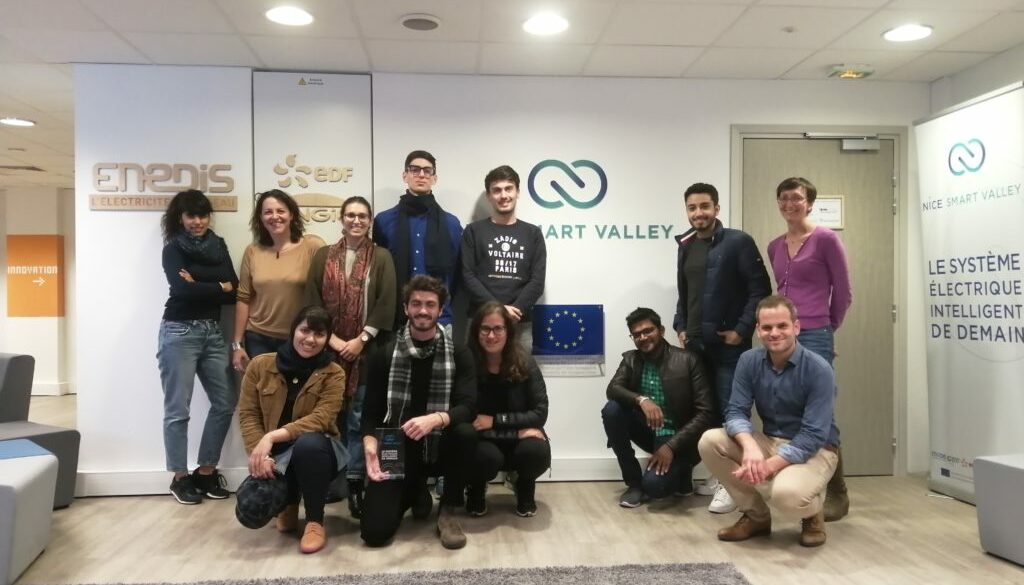Student Choice Award – Smart Energy Module was voted as the best module 2020
The Smart Energy module was appreciated by all the students for the quality of teaching and learning as well as for its lecturers, organisation and site visits.

The entire IMREDD Team would like to thank all the lecturers involved in this module for their outstanding commitment and expertise and continuous excellence in teaching.
We took this opportunity to interview Valentina VOLOGNI, head of the Smart Energy Module:
Valentina Vologni is an Environmental Engineer graduated from the University of Pavia (Italy) and holds a European Master EUREC in renewable energies. As a Renewable Energy researcher, she first develops wind, photovoltaic and hydraulic power projects for the Norwegian research institute Teknova. As a project engineer, she participates in the activities of “La Maison Passive” network dedicated to very high energy performance buildings, where she develops training courses for building owners and construction companies. She also contributes to the EuroPHit European project whose objective is the large-scale deployment of innovative solutions for renovation in the residential and tertiary sector. At the French Environment and Energy Management Agency (ADEME), she leads R&D projects in the field of industrial ecology and thermal comfort in tropical climate. As R&D coordinator for the Building Department, she is in charge of the national call for projects “Towards responsible buildings by 2020”. In the field of smart grids, she joined Enedis as Project Management Officer to help pilot the Nice Smart Valley demonstrator, part of the European Interflex program. Valentina joined Capenergies in 2019 as Flexgrid Project Manager. She contributes to the operational deployment of the Flexgrid program in the Alpes Maritimes and Var departments. Flexgrid is a program of national interest for the large-scale deployment of smart grid solutions.
– What is your course about?
I am the Smart Energy module coordinator and I personally teach a section dedicated to Smart Grids. The Smart Energy module presents the technical, economic and environmental issues related to efficient electricity transmission and distribution. A focus is given on the energy market. During the course the students will have an overview of smart green buildings and their connection to district energy networks, and the transformation of the consumer role into a prosumer. The interventions of energy experts in the course also help the students to see the big picture. In the Smart Grids section, the objectives are to understand why energy systems have evolved towards this kind of structures, to learn the basic components of smart grids and how they are designed and optimized. We also make a focus on storage and hydrogen and conclude the course with a group work on a case study.
– Why is it relevant in the smart city context?
The world population lives more and more in urban areas, and the way we produce and consume energy contributes greatly to the climate change challenge. To succeed in mitigating the effects of climate change, smart cities need to use energy efficiently, integrate more renewable energy sources and decarbonize the energy uses. That’s why smart grids and, nowadays, optimized energy systems, are essential to achieve the ambitious targets of the Paris agreement, decrease emissions from greenhouse gases and their harmful effects.
– What are the current developments and trends in the Smart Energy sector?
Some of the trends that are currently having an impact on the Smart Energy sector are : electric vehicles, artificial intelligence and digitalization, diffusion of energy storage and the use of hydrogen. The boom of electric transport and mobility will have an influence on energy consumption and on the grid. Artificial intelligence and digitalization will help efficient energy management and renewable energy integration. The integration of reliable energy storage assets will help the grid to be more flexible and balance variable supply and demand. Green hydrogen will allow renewable energy storage, for example with the deployment of Power-to-gas technology.
– Can you tell us a bit about Capenergies’ missions?
Capenergies is a competitiveness cluster working on the subject of energy in the Provence Alpes Côte d’Azur region of France. Our strategic activity focuses on decarbonising energy uses and increasing energy performance, optimising and securing local energy systems, and decarbonising energy production. We have over 500 members spanning from start-ups to big groups, research and training structures, financial backers, local authorities. One of our missions is, with the Provence Alpes Côte d’Azur region, the management of the Flexgrid program on large-scale deployment of smart grid solutions. The cluster provides a set of services across three portfolios: business growth support services, innovation support services and local authority services (we act as experts for public decision-makers on energy matters and help developing activities locally).
-What did you enjoy most in teaching at MSc Engineers for Smart Cities?
These students will contribute shaping future smart cities: it is therefore essential for them to learn the importance of energy management in a more and more urbanized world going through climate change. I enjoy showing them concrete examples that I take from my daily job and giving them the tools to assess the relevance of an energy project. Plus, being connected with students from all over the world with different skills and backgrounds certainly nurtures my teaching experience.

